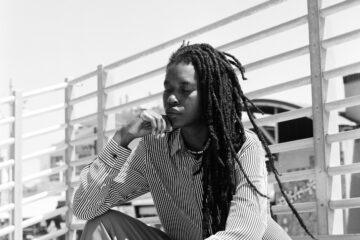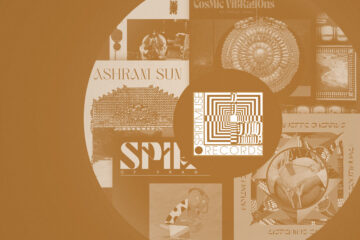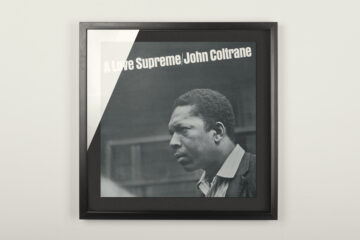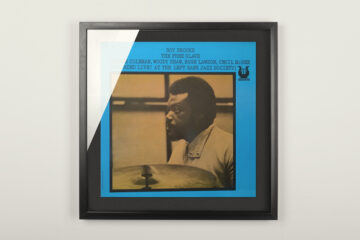Sharing the name of Franz Kafka’s novel where a salesman changes into a huge insect, Cykada’s new album sees them undergo their own transformation in their approach. They write with purpose, building »Metamorphosis« around a foundation that addresses the changes taking place in society.
Celebrating sound system culture with dubbed out grooves throughout the album, blended with jazz improvisation and raucous rock, it’s an explosive collection of songs that continues their trajectory from their 2019 self-titled debut.

Metamorphosis
Bringing together members from their contemporaries Ezra Collective, Maisha, Levitation Orchestra, Zurito, and Myriad Forest, the music feels akin to the cosmic voyage of their debut, but with greater swagger.
»So Divided« speaks about the illusion of control, and »The Cracks in the Bricks« about a society in denial –written just before the Covid-19 pandemic, this became increasingly relevant as time progressed.
With an official album launch in London to arrive early next year before an anticipated tour, we catch up with bassist and vocalist Jamie Benzies and drummer Tim Doyle after their EFG London Jazz Festival show.
How was it playing at EFG London Jazz Festival?
Tim Doyle (TD): Yeah, the gig was amazing. We haven’t been able to play that much as a band since the pandemic – obviously, everything just got fucking chucked on his head. It was a pretty special moment to be honest, the energy on stage was so good.
What has changed since the first album, or do you feel there’s been a natural progression to the second album?
TD: I think the intention behind the second album was much more driven. The first album felt kind of a celebration of just the genesis and experiencing what it was like playing in a room together. In the second record, we had deeper visions into the intention of the record.
You reference wars and climate change in your album – how much of the album was driven by these topics where it feels as if society is disintegrating?
Jamie Benzies (JB): The instrumental stuff is by nature quite abstract, and you can draw many different things from it. The lyrics are very specific and relate to metamorphosis on different personal and societal levels. »So Divided« is very clearly about division, but then the compartmentalisation of society is also the compartmentalisation of the self. The kind of fractal nature of what’s going on in society now, we’re all going through these personal struggles and how we react to that is on a broader scheme affecting how we all are interrelated.
It’s reflecting on our foundations based on violence and how it’s a part of our tapestry. It’s going to come back to us in different ways, especially when we are unable to really talk about it..
Jamie Benzies
»The Cracks in the Bricks« was a fun one. I wrote the lyrics with Tilé. It’s about the unexpressed death in things, »the cracks in the bricks« and this theme of stirring in the foundation that is making it weak or fractured. That was at a time when there was a lot of talk about places and venues like Colston Hall in Bristol which had been built by slave labour. It’s reflecting on our foundations based on violence and how it’s a part of our tapestry. It’s going to come back to us in different ways, especially when we are unable to really talk about it. It’s the same with the deaths and being unafraid of addressing these things and accepting them for what they are so that we can move on together to something more positive.
»The Cracks in the Bricks« was written before the pandemic – how much did you think that was going to foreshadow what was about to happen?
TD: Jamie prophesises so much! I was working a lot producing the record and every time I’ve heard these songs, the lyrics just got more and more poignant. When I took a few months off and came back to it, I was like, »wow, that’s actually happening«. The lyric you said, »the disease swipes a nation«, it was a metaphor, but it happened!
JB: It’s the illness of people not being at ease. We recorded a demo version of it I think the day before lockdown. We even stopped recording the session early because it was when all of this was being announced. A lot of these lyrics you can take from any kind of conflict or resistance in the world, and you’ll find that they probably apply perfectly to another one somewhere else where people are having a similar struggle.
What are the personal struggles you’ve faced whilst making this album?
TD: I think there’s so many struggles going on in our lives, it’s hard to pick any specifically that comes out in the music as they’re all present. The pandemic was probably the biggest struggle that we faced because everyone had their different experiences. All these things happened on a big political level, and they filter down to into our everyday existence, into our everyday reality. Living prices sucks, the gig situation is shit, the music industry sucks – it’s unavoidable.
JB: We’ve been dealing with a lot of grief. We’ve lost a lot of close friends and family in the last few years, and that process relates to the idea in »The Cracks in the Bricks« of undiscussed death and what happens when you then face that. That’s a metamorphosis personally I’ve been going through.
Living prices sucks, the gig situation is shit, the music industry sucks – it’s unavoidable.
Tim Doyle
Talking about metamorphosis: How much has the London scene changed since you started playing together 12 years ago?
TD: I think it’s changed quite a lot. It sort of began around pretty low key jam sessions and gigs. There was an event series called Steez which was kind of quite an important origin of pretty much everyone who’s now a part of this scene, they played there. That was where we all met each other and where we got our first gigs. As things grow and develop, people get picked by tastemakers and go in a certain direction … other people don’t fit in there perfectly. Then it starts to move on, everyone doesn’t have time. Everyone doesn’t get to hang out so much. It’s inevitably going to change and develop and become very different.
JB: Myself, Timmy and a friend Silas hosted some gigs where we were playing with lots of bands on the line-up. Most of the people who are now in Cykada were also there, playing in different bands, and there was also an Nubya Garcia, Moses Boyd, Theon Cross and everyone played.
TD: It was a warehouse squat party which is still my favourite context for this music. We can go till 7am and have no restrictions, that’s how I want to exist in my music life. It’s the best because there’s no bullshit, just do your thing.









